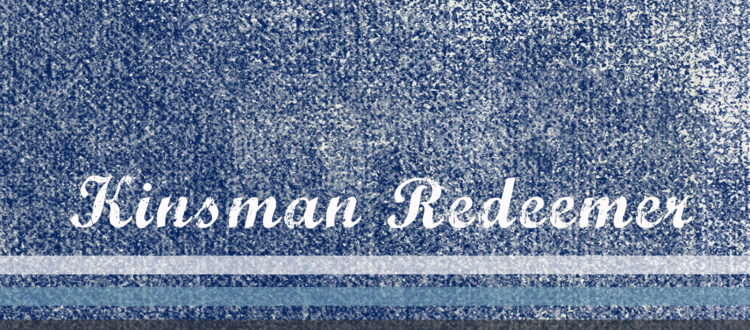The Kinsman Redeemer
In the Law, God made a provision for his people to experience something of a typical redemption–through a close relative–from the burden of sin and misery. The story of Ruth is the well known story of redemption by the kinsman redeemer. In his excellent commentary on Ruth, Iain D. Campbell explains how there were three circumstances during the Old Covenant era in which God gave provision for there to be a kinsman redeemer. He writes:
“There were some circumstances that could arise in the course of family life in the Old Testament that required the services of a kinsman. If, for example, the blood of a member of the family was shed—if someone was murdered in the family, it was the responsibility of the kinsman to avenge the blood of his relative. It was the kinsman that pursued the murderer. God set apart six cities in Israel to be cities of refuge, to which the slayer of blood could run for refuge and sanctuary. However, the slayer of blood was pursued constantly by the kinsman who was going to avenge the death and the blood of his relative.
There were also instances where a member of the family became so poor that he had to sell himself into slavery. It was the responsibility of the kinsman, if he could, to secure a ransom price that would release that person from his slavery and give him freedom.
The particular duty of the kinsman that is highlighted in the Book of Ruth dealt with property. There was a threefold duty of the kinsman—to respect the blood of his relative, the liberty of his relative and the property of his relative. If for some reason the property or the land was forfeited by the man who owned it and was lost to him because he was poor, it was the duty of the kinsman to try and redeem it until the year of jubilee, every fiftieth year in Israel, when the land was restored to those that originally possessed it.”1
All of this was, of course, typical of what Jesus, our redeeming elder brother (Heb. 2:10-18), would do for us in the work of redemption. Jesus came to shed His blood for the guilty. In this sense, he is both the avenger and the deliverer. He upholds the justice of God by taking the punishment on himself and then He dies to set the guilty free. Jesus is also the kinsman redeemer who sets his indebted brethren free. He is the year of jubilee. Debts cancelled and bonds loosed! Finally, Jesus is the kinsman redeemer who restores what man lost by the fall and by his sin. He gives His people an everlasting inheritance freely by His grace. He is the greater Boaz who, by his law-keeping and sacrificial love, secures redemption for Jew (Naomi) and Gentile (Ruth) who comes to him for redemption.
1. Campbell, I. D. (2010). Ruth: A Devotional Commentary (p. 117). Leominster: Day One Publications.



